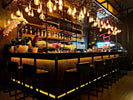
7 Questions to Answer Before You Open Your Own Bar


If you have an entrepreneurial spirit and a love for making drinks, you may wonder what it feels like to run your bar. Opening one is like starting a business of any kind. However, since it entails alcohol, it has more stringent legal requirements.
Therefore, you’ll want to be well-prepared before starting your own. Here are some questions and their corresponding answers to help you start your new venture correctly.
Drinking establishments have different appeals. Knowing what kind of bar you want to launch is important before identifying your ideal target audience. The common types of bars include:
Are you catering to blue-collar workers, college students or music lovers? Do a competitive analysis to determine your bar’s target market. Know who your customers are and why they need your services.
Location is one of the key factors that can determine your bar’s profitability. Being near your target market allows you to reach your customers more efficiently. If your drinking establishment is distant from your audience, they may find it challenging to locate you. You want to make it convenient for your prospective customers to visit you.
Alcohol is a heavily regulated sector. To operate, you must obtain a license from the Alcohol and Tobacco Trade and Tax Bureau, which regulates alcohol production, wholesale and importation corporations. Next, acquire business licenses at the state and local levels.
You also require a food service permit if you're serving food. Like any company, you’ll need to apply for an Employer Identification Number from the IRS, which is required when operating a company within the U.S.
Maybe you’re torn between establishing your own or partnering with a franchise. Both options have pros and cons. Starting your own brand is ideal if you’re motivated to create something from the ground up.
Buying a franchise means you’re venturing into a proven system with a lower risk than beginning independently. It provides established business processes, procedures and operational techniques so you don’t have to start from scratch.
Opening your bar requires you to consider getting funding. The cost will depend on various factors, including the type of business, location and staff. The average ranges between $100,000 and $850,000, depending on size.
The expected ongoing expenses will depend on many factors. Here’s a rundown of the most common:
As with any business, your bar needs the right staff. You may take the manager role or hire someone to lead alongside you. You should also prepare competitive pay and benefits to attract bartenders and other staff.
A skilled bartender should know how to make good eye contact with customers and be a great conversationalist to attract regulars.
Starting a bar is no easy feat. Take time to answer these questions one step at a time. You’ll succeed in your venture as long as you stay consistent and dedicated to the process.

